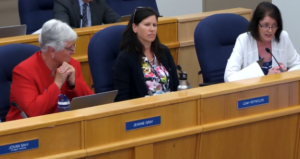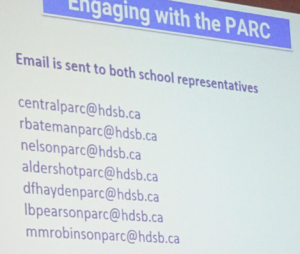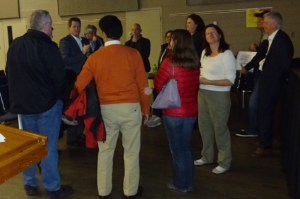 By Pepper Parr
By Pepper Parr
January 12th, 2017
BURLINGTON, ON
The flow of information between the Program Accommodation Review Committee (PARC) and the Board of Education trustees is a concern that Leah Reynolds brought up at the school board meeting last night.

Trustee Leah Reynolds, centre, wanted to know why she wasn’t getting copies of emails sent to the PARC members.
Reynolds, who represents Burlington wards 1 and 2, wanted to know when she would get copies of the emails that get sent to the PARC people.
Reynolds wanted to be fully aware of what the PARC members are hearing and said she “owed it to the community to fully understand what the feelings and concerns are”.
It wasn’t immediately clear just what was happening to the emails that citizens send to the PARC members. A concern was expressed about email that may not be at all appropriate and that doesn’t get through the system.
Reynolds wanted to know who was responsible for the distribution of email that goes to PARC members. The Board created email addresses for the PARC members the public can use to communicate. Reynolds feels that communication is important and she would like to know what is being said.

The Board of Education created special emails for members of the PAR committee. Citizens could use the one address to communicate with the PARC member representing their school
There was discussion about support for PARC members who might be finding the content of some of the email objectionable and inappropriate.

The PAR committees meeting immediately after the early December public meeting.
Scott Podrebarac, a Board of Education Superintendent and chair of the PARC said that the PARC people have had meetings and that minutes are being taken. However, the trustees have not seen these minutes.
Superintendent of Education, Gord Truffen, who oversees information technology for the board, expressed some concern over the confidentiality of email addresses and told the Board meeting that there hasn’t been all that much traffic to the members of the PARC at the email addresses created for them.

Ward 2 Councillor Marianne Meed Ward with ward 1 and 2 school board trustee Leah Reynolds. Meed Ward sits on the PAR committee which will produce a report for the Director of Education who will use the contents of the report in his recommendation to the trustees on which high schools, if any, to close.
What trustee Reynolds wants are the opinions people are expressing so that she can have a clearer sense as to just what the community wants. She doesn’t feel she is getting what she feels she needs.
There may be a communication problem. Reynolds was the only trustee to speak to that matter.



















Maybe the Trustee can look at the Gazette archive to get at least some sense of what some people are saying and/or want.
My personal submission she will get soon, but I can’t speak for others.
She needs to appreciate that there is a lot of LTAP and other information on the Board website, but knowing how to find it, and the time to read and comprehend it, are daunting for people not used to this kind of analysis. And if they have both jobs along with their kids and home responsibilities, this just gets much worse.
One thing that is missing on the accessible website are enough years of the LTAPs and reports to go back to the time that Hayden SS in Alton was being rationalized and justified.
Only back to 2010-2011 is available, and you can already see the troubles looming but there is no hint of how Hayden was justified on pupil place needs -there weren’t any – when it was already known that building the school would drain all the students from the existing high schools and create a large and growing surplus there while overfilling Hayden even with Portables right from the start.
So if the Trustee knows that set of facts, and others do as well, what does she think resident feelings and concerns are?
Also, the Gazette published the results of the 25 questions put to residents. There has been some concern expressed that the responses may be biased because of the representation by school is not even.
This is clearly because all of the schools are not explicitly named as the primary option for closures, so there is a selection bias built right into the sampling frame itself, used by the Board consultant.
This sample of the resident/parent/student populations reflects the selection of schools that are directly named for closure or other changes – Central, Pearson, and Hayden. It is perfectly expected that the population of these schools would self-select to participate.
The low turnout from the other schools is also expected on similar grounds as not being in the selected schools directly affected.
In my opinion, the selection of schools is biased, so the turnout population sample reflects this bias – in effect the net bias balances out.
This is my summary of the details of the responses. The opposite views are found by subtraction from 100%.
When you consider these closely, you can see what parents think about what they were asked, and what they want.
1) Important are no school closures, and it is agreed the Board allocate the budget to fund empty spaces (Q22, 74%), present empty spaces are sustainable (Q24, 76%), disagree with Board 90% utilization goal (Q23, 78%), not concerned about empty spaces being underutilized (Q10, 71%).
2. The importance of the home schools for core/mandatory subjects, and even optional/elective, is quite emphatic (Q2,94%, Q3,76%, Q4,80%, Q6,58%, Q5,51% and consistent; Q7 indicates some support (63%, but only 35% are very willing), for optional/elective in alternatives like summer school, night school, e-learning, another school.
3) With some repetition for emphasis and comprehensiveness, it is consistent with this general sentiment of retaining all home schools that: residents are not concerned about spaces remaining underutilized (Q10, 71%); do not agree with the Board 90% utilization goal (Q23,78%); and again, want the Board to allocate the budget to fund empty spaces (Q22, 74%); see being within 3.2 km, or 2 mile, Board mandated walking distance to home schools as important (Q18, 86%) – 69% already walk, 14.5 ride bus (Q19); see reduction in bus transportation to each school as important (Q20, 79%);
– See spending secondary years in one school as important (Q21, 98%); are concerned that appropriate learning facilities be accessible (Q9, 86%); want a full range of pathway programs (Q8, 81.3%); feel current situation is sustainable (Q24, 76%); see it as important to minimize the use of portables (Q17, 74%).
4. Suggesting further support for retaining all schools are the following: a full range of extra-curricular activities is important (Q11, 82%) – in my view, this implies more schools with more space for fewer students, means more opportunities;
– Parental support to help students do extracurricular at another school is not at all likely, or not very likely, for 45% of respondents, compared to 55% at somewhat or very likely (Q12); the importance of the highest level of competition in athletics is not important (Q13, 81%)- in my view, this implies the larger top tier schools with large student populations are not important in this regard.
5. Other parent/resident views seem to reflect a small majority percent expressing that: the physical condition of the school as not at all or very important (Q14, 53%); that the importance of the school as up-to- date and fully accessible, with elevators and air conditioning, not at all or not very important (Q15,61%); preserving existing community partnerships at current school (pools, libraries, community center) is very to somewhat important (Q16, 53%).
Again, the opposite views and percent support can be simply derived by subtraction.
So this is one part of a submission I will provide soon. This can be checked by going to the Gazette story that gives all of the data and the entire question, including all four of the response brackets.
I provide this here in good faith that I am accurate and unbiased in my analysis.
“All PARC meetings are open to the public for observation. Agenda and notes of each meeting, along with any additional documentation will be posted on this page”
The above was taken from the board’s site, when posted this should provide the answers to trustee Reynolds questions.
Editor’s note: The trustees concern was with email – she was fully aware of the PARC meetings being open to the public.
Any relevant information from emails sent to PARC members would likely be discussed during their meetings and later posted on the board’s site.
Thank you John for your tremendous ability to quote passages from websites and council meetings. Trouble is, as usual they have little to do with the issue in question.
And I thought I was the only joker in the Gazette.
C Jester
Your welcome and thank you for taking the time to read and consider my comments.